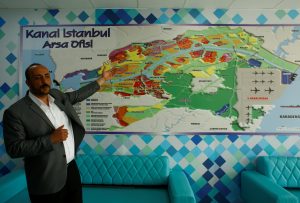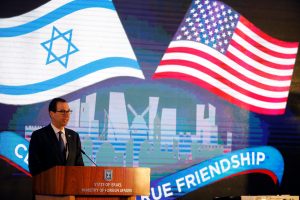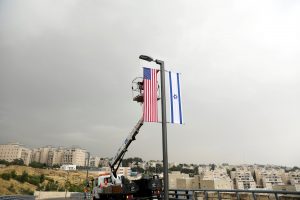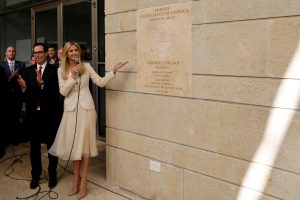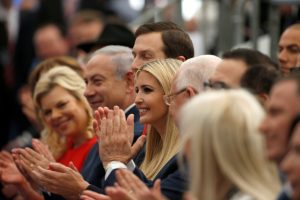
By Dan Williams
JERUSALEM (Reuters) – The crowd sported branded baseball caps and Israel’s prime minister wore red, white and blue as the United States opened its embassy in Jerusalem on Monday, delighting Israelis and deepening Palestinian anger.
“Our greatest hope is for peace,” U.S. President Donald Trump said in a recorded video message, even as a spokesman for the Palestinian president accused him of sowing instability by overturning decades of U.S. policy on the status of the city.
The inauguration of the embassy, after Trump outraged the Arab world and stoked international concern by recognising Jerusalem as Israel’s capital in December, was hailed by Israeli Prime Minister Benjamin Netanyahu as a “glorious day”.
Trump opted not to attend the ceremony in which a U.S. consular building was re-purposed into an embassy, pending the construction of a new facility, probably years away.
His daughter Ivanka and son-in-law Jared Kushner, both White House advisers, were there, seated next to Netanyahu opposite a stage with a backdrop of U.S. and Israeli flags. Two American pastors and a rabbi gave invocations.
Kushner, in a rare public speech, said the relocation from Tel Aviv, a diplomatically and politically sensitive step promised but never implemented by a succession of U.S. presidents, showed that Trump was a man of his word.
The comments were telling, just a week after Trump announced Washington’s withdrawal from the nuclear deal between Iran and world powers, a move that critics said weakened global trust in the United States.
GAZA VIOLENCE
“When President Trump makes a promise, he keeps it,” Kushner said, a reference to a campaign pledge to open a Jerusalem embassy. “Today also demonstrates American leadership. By moving our embassy to Jerusalem, we have shown the world once again that the United States can be trusted.”
Palestinians, with broad international backing, seek East Jerusalem as the capital of a state they want to establish in the occupied West Bank and the Gaza Strip.
Israel regards all of the city, including the eastern sector it captured in the 1967 Middle East war and annexed, as its “eternal and indivisible capital”. The Trump administration has avoided that description, and noted that the city’s final borders should be decided by the parties.
The crowd, many wearing the caps marked “U.S. Embassy, Jerusalem, Israel” rose for numerous standing ovations. Attendants handed out pretzels and mineral water.
A smiling Netanyahu, decked out in U.S. colours – a blue suit, white shirt and red tie – showered praise on Trump, a president with whom he is in lockstep on many regional issues.
Thanking Trump for “having the courage” to move the embassy, Netanyahu said: “This is a great day. A great day for Jerusalem. A great day for the state of Israel. A day that will be engraved in our national memory for generations.”
Split screens on Israeli television stations showed a more complex story.
As coverage of the embassy ceremony ran on one side of the screen, the other broadcast the violence along Israel’s border with Gaza, where dozens of Palestinian protesters were killed by Israeli gunfire.
Amid expressions of international concern and condemnation over the use of live ammunition, Israel said it was taking the necessary measures to prevent any breach of its border fence with the enclave run by the militant Hamas movement.
Kushner, echoing the Netanyahu government’s position that the six weeks of Gaza protests were being orchestrated by Hamas Islamists opposed to Israel’s existence, said: “Even today those provoking violence are part of the problem and not part of the solution.”
(Editing by Jeffrey Heller and Andrew Heavens)

